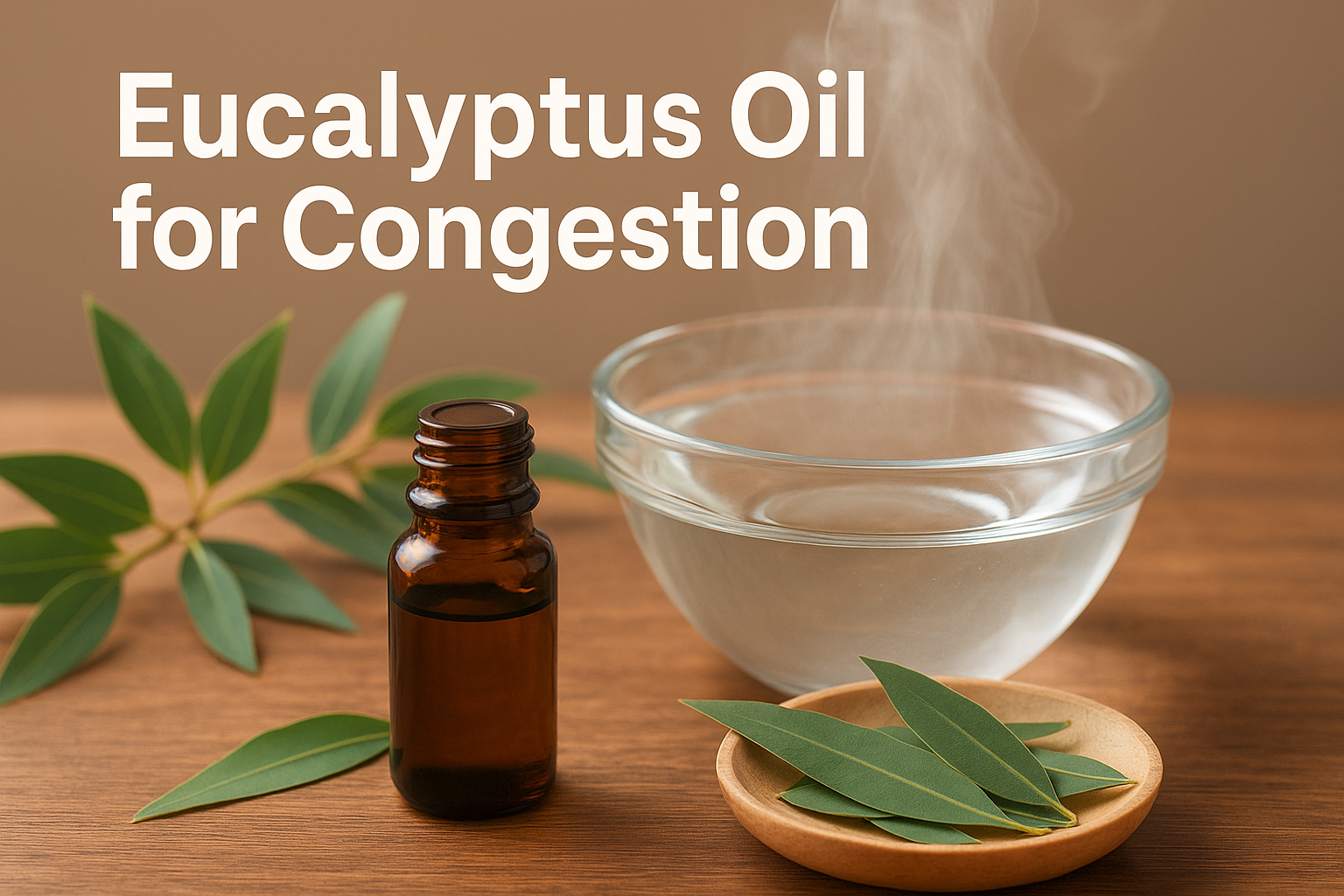Introduction: The Natural Way to Breathe Easy
Struggling with nasal congestion or stuffy sinuses can make even simple breathing a challenge. Instead of reaching for over-the-counter decongestants, nature offers a time-tested remedy — eucalyptus oil. Extracted from the leaves of the eucalyptus tree, this refreshing essential oil has been used for centuries in aromatherapy to open up airways, soothe the respiratory tract, and promote relaxation.
Eucalyptus oil contains eucalyptol (cineole), a compound known for its anti-inflammatory, antiviral, and expectorant properties. It helps loosen mucus, clear nasal passages, and relieve sinus pressure naturally. Whether used in steam inhalation, a diffuser, or massage oil, eucalyptus can be your go-to solution for respiratory relief.
Let’s explore how to use eucalyptus oil effectively for congestion relief, its benefits, and the right precautions to follow.
Benefits of Eucalyptus Oil for Congestion Relief
Eucalyptus oil works wonders for both nasal and chest congestion. Its active compound, 1,8-cineole, helps break down mucus while soothing irritated airways. Here’s how it supports respiratory health:
- Clears nasal passages: Acts as a natural decongestant by reducing inflammation in nasal tissues.
- Fights infection: Its antimicrobial properties combat bacteria and viruses that cause colds and sinus infections.
- Eases breathing: Opens airways by relaxing bronchial muscles.
- Reduces sinus pressure: Provides relief from headaches and facial pain caused by congestion.
- Boosts immunity: Regular aromatherapy with eucalyptus oil can strengthen respiratory defenses.
A 2024 study in the Journal of Natural Medicine found that inhaling eucalyptus vapor for 10 minutes improved breathing comfort by 40% among people with sinusitis, confirming its role as an effective natural remedy.
Step-by-Step Guide: How to Use Eucalyptus Oil for Congestion
Here’s how you can safely and effectively incorporate eucalyptus oil into your aromatherapy routine to clear congestion.
Step 1: Steam Inhalation for Instant Relief
Steam inhalation is one of the quickest ways to ease congestion.
How to do it:
- Boil water and pour it into a bowl.
- Add 3–5 drops of eucalyptus essential oil.
- Lean over the bowl, cover your head with a towel, and inhale deeply for 5–10 minutes.
- Keep your eyes closed to avoid irritation.
This method helps loosen mucus, clears the nasal cavity, and provides immediate relief from sinus pressure.
Step 2: Use in a Diffuser or Humidifier
For long-lasting relief, add 4–6 drops of eucalyptus oil to a diffuser or humidifier.
As the vapor spreads, it cleanses the air, opens airways, and supports restful sleep. Perfect for nighttime congestion relief, especially during seasonal changes.
Step 3: Eucalyptus Chest Rub (Aromatherapy Massage)
Create your own DIY chest rub to soothe chest congestion naturally.
Recipe:
- 2 tablespoons coconut or olive oil (carrier oil)
- 4 drops eucalyptus oil
- 2 drops peppermint oil (optional for cooling effect)
Massage gently onto the chest, back, and throat area. The combination helps break up mucus and enhances relaxation through aromatherapy.
Additional Ayurvedic & Aromatherapy Tips
In Ayurveda, eucalyptus oil is associated with the Kapha dosha, making it ideal for individuals who experience heaviness, congestion, and sluggishness. Here are a few extra ways to boost its effect:
- Warm Compress: Add a few drops of eucalyptus oil to warm water, soak a towel, and place it over your chest for 10 minutes.
- Eucalyptus Bath: Mix 5 drops of eucalyptus oil into warm bathwater to relieve congestion and fatigue.
- Aromatic Blend: Combine eucalyptus with tea tree or lavender oil for an enhanced antimicrobial and calming effect.
Remember, eucalyptus oil works best when combined with deep breathing or pranayama, supporting holistic respiratory health through aromatherapy and Ayurveda principles.
Safety Precautions and Side Effects
While eucalyptus oil is natural, it must be used with care.
- Do not ingest eucalyptus oil — it can be toxic if swallowed.
- Always dilute with a carrier oil before applying to the skin to prevent irritation.
- Avoid using near infants or pets, as their respiratory systems are sensitive.
- If you have asthma, consult your doctor before inhaling concentrated vapors.
- Pregnant or breastfeeding women should use under medical supervision.
A 2025 report from the National Center for Complementary and Integrative Health (NCCIH) emphasizes that proper dilution and safe inhalation are key to avoiding side effects such as dizziness or skin irritation.
Conclusion: Breathe Better, Naturally
Using eucalyptus oil for congestion offers a safe, effective, and soothing way to restore easy breathing. Whether through steam inhalation, diffusers, or chest rubs, this aromatic essential oil provides fast relief while promoting relaxation.
Incorporate it into your daily aromatherapy routine during cold seasons or when you feel sinus pressure building up. Nature’s healing power, captured in a few drops of eucalyptus oil, can help you breathe freely and feel refreshed—naturally.
FAQs Section
How does eucalyptus oil help with congestion?
Eucalyptus oil contains eucalyptol, which acts as a natural decongestant, reducing mucus buildup and clearing nasal passages for easier breathing.
What’s the best way to use eucalyptus oil for congestion?
The most effective method is steam inhalation—add 3–5 drops of eucalyptus oil to hot water, cover your head, and inhale deeply for 10 minutes.
Can I use eucalyptus oil while sleeping?
Yes, adding a few drops to a diffuser before bed helps open nasal passages and supports better sleep during congestion.
Is eucalyptus oil safe for children?
It’s not recommended for children under 6 years old due to potential respiratory irritation. For older children, use diluted blends and avoid direct inhalation.
Can eucalyptus oil be mixed with other oils?
Yes, it blends well with peppermint, tea tree, or lavender oil to enhance respiratory and relaxation benefits in aromatherapy.

